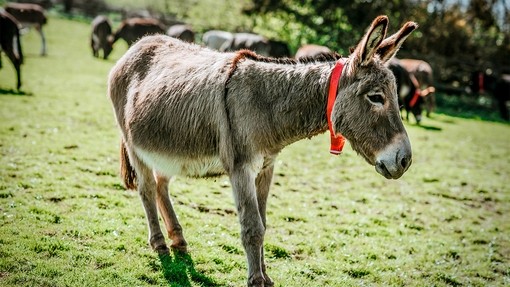Signs of infection
We cannot be certain how European and Asian donkeys will respond to African horse sickness.
They appear to be moderately susceptible and have a population mortality rate of 10%, but the disease is newly introduced into the region, so the outcome could be unpredictable; it might cause high mortality even in donkeys, as they have probably had no exposure to this virus before (a naive population).
Donkeys may have subclinical infection and may not be diagnosed.
In Africa donkeys can often be affected clinically and show typical signs of the pulmonary or mixed forms of the disease with mortalities.
Typical signs include:
- Swelling above the eyes, progressing to the eyelids and head and neck. The head may look swollen
- Reddened eyes
- Difficulty breathing, with widely open nostrils
- Foaming/fluid from nostrils, in the terminal stages of disease
They may have a fever and may show signs of weakness.
Watch for the general signs of ill health in a donkey; these can be very subtle and easily missed.
Sick donkeys should be sampled and tested.
What to do if you suspect that your donkey may be displaying symptoms:
- Contact your local vet or animal health worker as soon as possible
- Rest your donkey
- House your donkey, where possible, in a shelter that is protected from biting insects
- Take other preventative measures to stop biting insects such as using a insect repellent.
Note: a mixture of infection with glanders and strangles can complicate the signs and African horse sickness may be missed. It is important to test and capture the information about disease spread.
Prevention
Prevention of disease spread should mainly be around protection against biting insects.
- To reduce contact with biting midges infected with African horse sickness virus, house equids at night from 2-4 hours before sunset to 2-4 hours after sunrise.
- Provide additional protection to housing to reduce midges entering by using mesh (80% shade cloth) to cover all openings (e.g. door and window openings) at night. The cloth may be impregnated with an insecticide (a pyrethroid).
- Spray housing walls and protective mesh with an insecticide (a pyrethroid) effective against biting midges.
- Apply insecticides to the animal that are registered for use on equids in the late afternoon and early morning, focussing on preferred midge biting sites such as the head, neck, back and belly, e.g. fly sprays containing cypermethrin or permethrin. But note that the insect will have bitten the equid before being killed.
- Apply insect repellent to equids in the late afternoon and early morning, focussing on preferred midge biting sites such as the head, neck, back and belly. (use DEET or natural products such as Neem oil and Eucalyptus oil). Monitor for adverse skin reactions.
Take care to monitor the skin of the animal for damage or irritation caused by insect repellents.
- Where possible, move equids away from midge breeding sites, such as marshes, paddy fields and muddy areas.
- Avoid having stagnant water, repair leaking water pipes and troughs to reduce midge breeding sites.
Keep informed and stay up to date with the latest information from your government.
Other biting insects can also spread this disease. Don’t feed infected meat to animals. African horse sickness can kill dogs.
Blood can carry the virus. Do not reuse needles and keep midges away from blood spills.
Methods that do not prevent African horse sickness
- Smoking drums around stables. This has no effect on midge activity and will harm the health of people and animals.
- Insect repellents used on their own. Covering or housing equids during high risks periods is needed as well.
- Garlic.
- Citronella oil - this may even attract midges.
- Moving equids to higher altitude. Midges can tolerate altitude, providing other environmental conditions are adequate.




